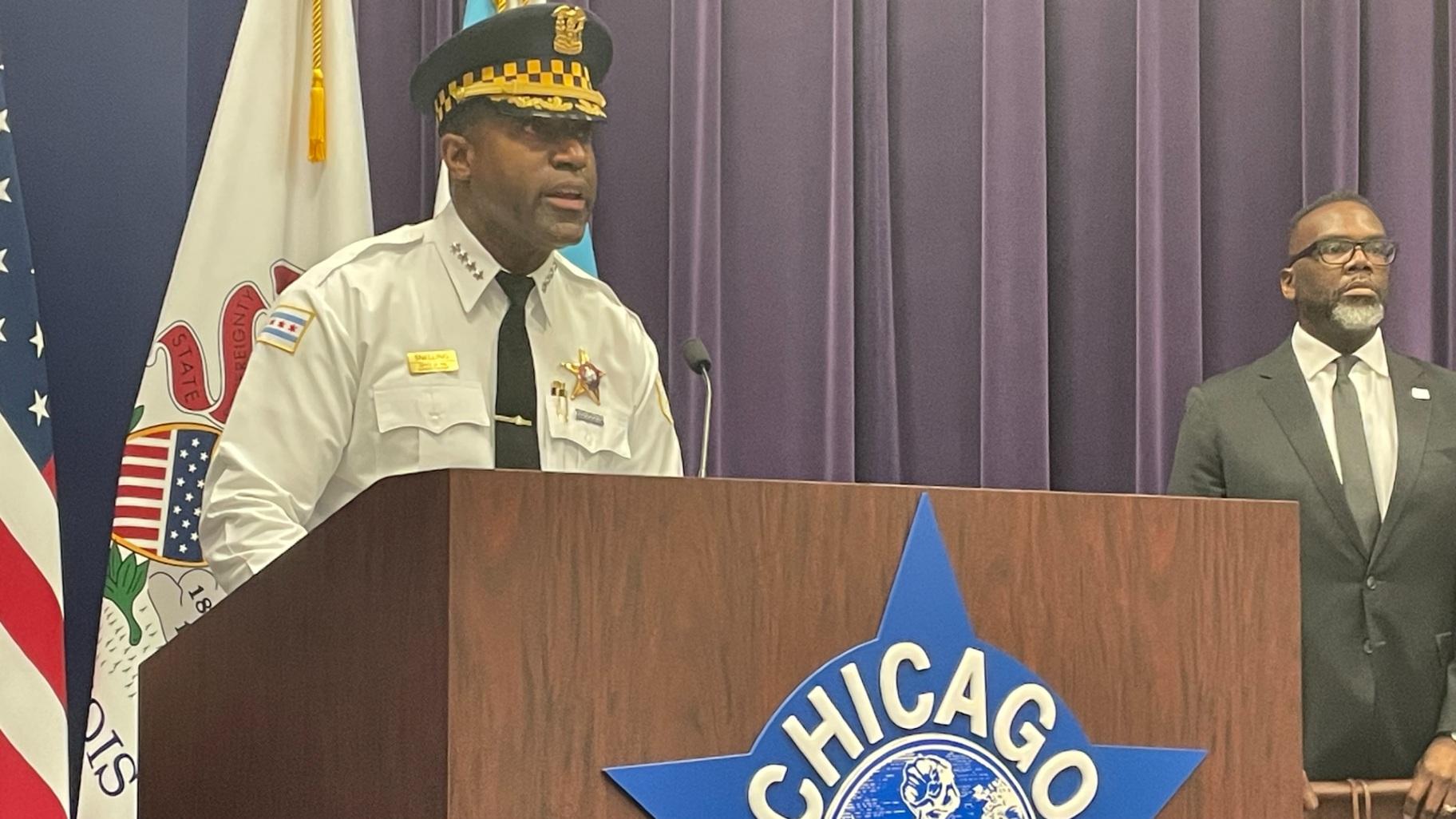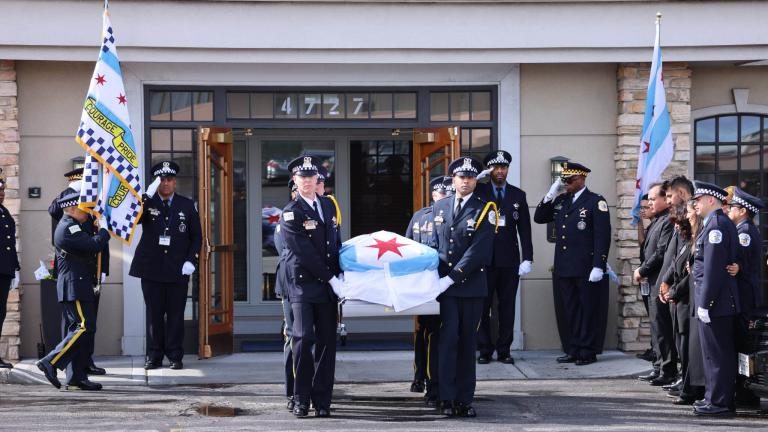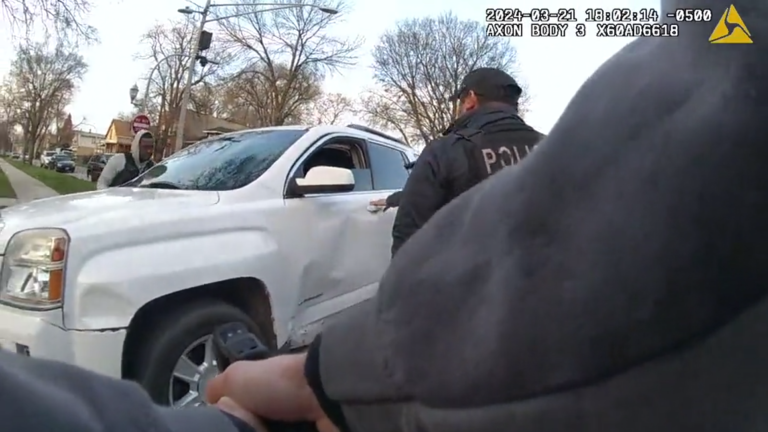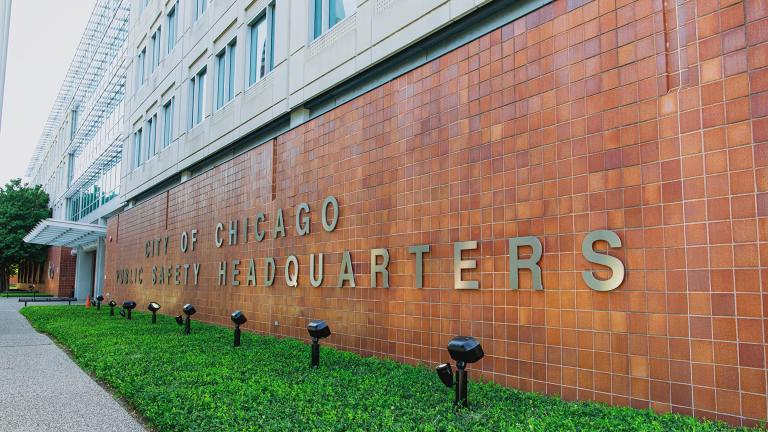 Chicago Police Supt. Larry Snelling addresses the news media on Friday, April 12, 2024, as Mayor Brandon Johnson looks on. (Heather Cherone / WTTW News)
Chicago Police Supt. Larry Snelling addresses the news media on Friday, April 12, 2024, as Mayor Brandon Johnson looks on. (Heather Cherone / WTTW News)
Even though Chicago Police Superintendent Larry Snelling said police brass track complaints filed against officers to identify troubling patterns of behavior, there is no evidence CPD leaders knew that the five officers who stopped Dexter Reed shortly before officers fatally shot him had racked up three dozen complaints in the months before the March 21 shooting.
Investigators said four of the officers fired 96 shots in 41 seconds at Reed shortly after he shot and wounded an officer, who is recovering.
Representatives of the Chicago Police Department declined to answer questions from WTTW News about the system Snelling described to reporters. However, a spokesperson said the system Snelling referred to during a Friday news conference was an internal system and not available for public review.
Read More:
- 4 Chicago Police Officers Fired at Dexter Reed 96 Times in 41 Seconds After He Shot Officer in Arm: COPA
- COPA Chief Raises Concerns About Why Police Pulled Over Dexter Reed Before Deadly Shooting
- When Can Chicago Police Officers Use Force? Here’s What to Know
- Breach Between Top Cop, Misconduct Agency Widens Amid Probe of Shooting Death of Dexter Reed
“We have a dashboard,” Snelling said, adding that he reminded his command staff after Reed’s death they are required to check it regularly. “It will give us alerts if we see officers who have multiple complaints. And then at this point, we’ll take action based on what we see.”
That action could include additional training, counseling or “removing that officer from the street for a while,” Snelling said. “We’ll be able to do a full assessment of this officer, and if we think that this is somebody who shouldn’t be in this position or shouldn’t be wearing the uniform, we’re going to take action on that, too.”
“We as a police department have to make sure that we have them on the radar and that we take action,” Snelling said.
Just because officers have complaints filed against them, Snelling said, it does not make them “bad officers.”
“We as a police department have to make sure that we have those people on the radar and that we take action,” Snelling said. “We just have to make sure that we find out why these officers have complaints against them. And if we see patterns of behavior, we will, we absolutely need to, address that and we will address it.”
Snelling said CPD officials “recently created” the dashboard to increase accountability for officers.
However, Snelling’s promise of accountability is contradicted by the fact that the five officers who stopped Reed had been the subject of at least 36 complaints in 2023 and 2024 that alleged they were improperly stopping Chicagoans driving through the city’s West Side, according to records provided to WTTW News by the Civilian Office of Police Accountability, known as COPA, in response to a Freedom of Information Act request.
Three of those complaints allege the same officers made similar traffic stops in the city’s Harrison (11th) Police District on Feb. 26, March 1 and March 6, less than a month before the traffic stop that led to Reed’s death.
The records provided to WTTW News by COPA documenting the complaints stemming from the Feb. 26 traffic stop were nearly entirely redacted by COPA officials. The driver who was stopped on March 6 said he was stopped without justification and their car was searched without probable cause. Like Reed’s car, the car that was stopped on March 6 had tinted windows.
Officers told COPA investigators at the scene of the fatal shooting they stopped Reed because they believed he was not wearing his seat belt, a violation, according to reports signed by the officers involved and released by COPA because they are public records.
When COPA released the footage of Reed’s shooting, officials said in a news release they had recommended that the officers who shot at Reed be stripped of their police powers during the investigation.
COPA Chief Administrator Andrea Kersten told Snelling that recommendation was based on “grave concerns about the officers’ ability to assess what is a necessary, reasonable, and proportional use of deadly force,” according to a letter released by COPA in response to a Freedom of Information Act request filed by WTTW News.
One of the officers fired at least 50 times at Reed, including three times while he was motionless on the ground, according to Kersten’s letter to Snelling. That officer reloaded his weapon twice, while three other officers reloaded their weapon once, according to the letter.
That letter also questioned the basis for the traffic stop that led to Reed’s death.
“Specifically, COPA is uncertain how the officers could have seen this seat belt violation given their location relative to (Reed’s) vehicle and the dark tints on (his) vehicle windows,” Kersten wrote. “This evidence raises serious concerns about the validity of the traffic stop that led to the officers’ encounter with (Reed).”
There is no evidence that the officers who shot at Reed, who were part of a five-member, plainclothes tactical team, targeted Reed or his car for any reason other than a seat belt violation, Kersten said.
“We’ve obviously noticed the tint of the windows, as well,” Kersten told WTTW News on April 9. “All of that are factors that we will have to consider as we move through this investigatory process.”
During his remarks to reporters, during which he called COPA “irresponsible,” Snelling suggested that “communication” was also necessary to identify officers who had racked up a number of complaints.
“Communication would be appreciated,” Snelling said. “I don’t believe that if we see something of that nature that we shouldn’t reach out to the heads of departments and talk to them about the problems that you’re seeing. We’re all in professional roles, and we should be professional with each other.”
However, there is no mechanism for COPA to communicate that kind of information to Snelling or other members of his command staff, since the agency is charged with investigating police misconduct not helping police supervisors manage officers.
Instead, a federal court order requires CPD to create its own system to alert commanders about which officers have been the subject of repeated police misconduct allegations. More than five years after that order took effect, CPD has yet to do so.
Known as the consent decree, the federal court order is designed to compel the Chicago Police Department to change the way it trains, supervises and disciplines officers. CPD is in full compliance with just 6% of that 2019 court order, according to the monitoring team charged with enforcing the order.
Seven years ago, a probe by the U.S. Department of Justice found that Chicago police officers were rarely held accountable for misconduct because of badly broken systems as well as a “code of silence” among officers that allowed them to act with impunity.
WTTW News reported in September that a system designed to flag officers with multiple complaints, like the officers who shot and killed Reed, could have been rolled out citywide in May 2021 but remains in use in only one police district.
The University of Chicago Crime Lab began work on the so-called Officer Support System, also known as OSS, in 2016, and began testing it in a South Side police district in September 2020, only to face repeated and lengthy delays, caused in part by decisions by CPD leadership to transfer the staff members assigned to run the system to patrol, according to a letter obtained by WTTW News through the Freedom of Information Act.
Police reform advocates unanimously believe there is a clear need for a system that flags officers with multiple complaints and lawsuits to prevent incidents that make it impossible to restore the public’s trust in the beleaguered police department, which has faced decades of scandals, misconduct and brutality.
Inspector General Deborah Witzburg has repeatedly warned that true police reform will be impossible until the city starts collecting and analyzing data to “effectively manage the risk of expense to the city and harm to its residents arising out of CPD’s operations.”
CPD representatives said in a September statement that the Officer Support System remains in the pilot phase as officials “review and assess the program and it’s corresponding policy to ensure it is being utilized effectively ahead of a citywide rollout.”
Nothing has changed in the seven months since that statement, CPD representatives told WTTW News.
Johnson responded to WTTW News’ article by saying fulfilling the terms of the consent decree was a “top priority.”
“We are moving with expediency,” Johnson said in September, vowing to act with more “hurriedness” than his predecessors.
Contact Heather Cherone: @HeatherCherone | (773) 569-1863 | [email protected]
A Safer City is supported, in part, by the Sue Ling Gin Foundation Initiative for Reducing Violence in Chicago.








